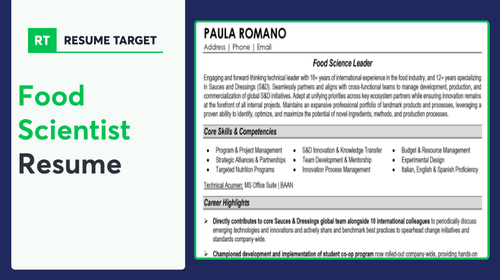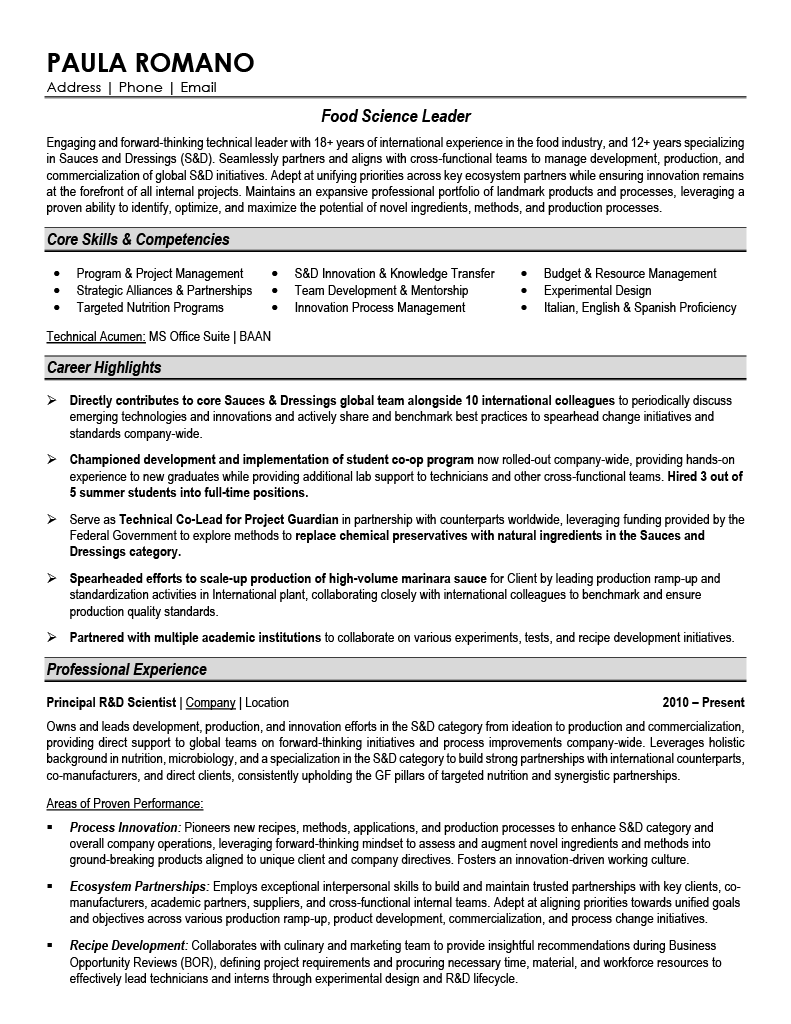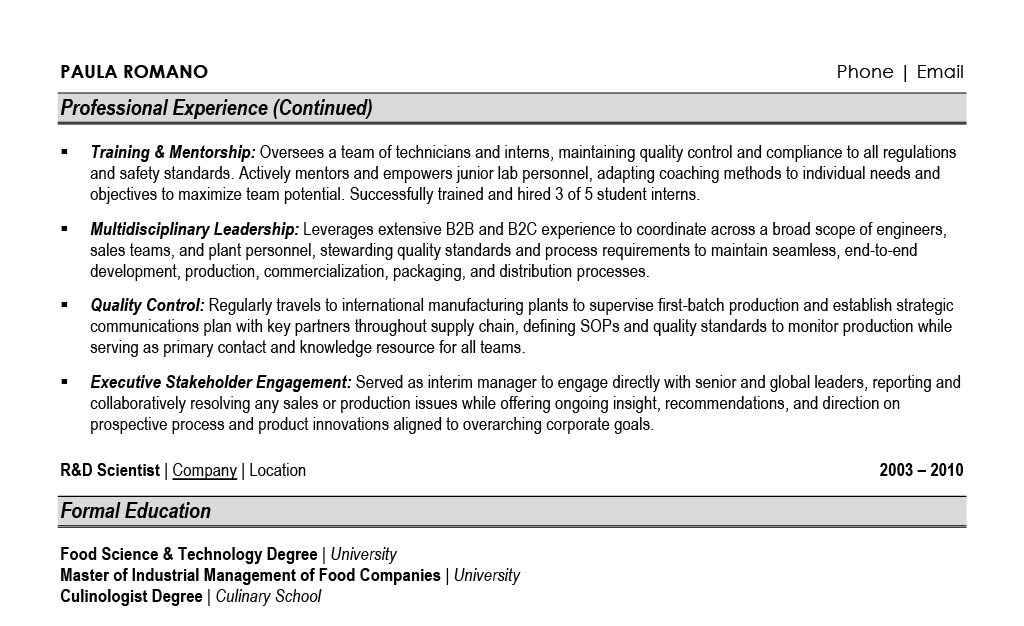

Translating complex food chemistry into compelling resume content can feel like an impossible recipe. Your groundbreaking research and product innovations deserve more than a bland list of lab techniques.
Are you struggling to make your technical expertise digestible for hiring managers? A well-crafted resume can transform your scientific achievements into clear business value that food companies instantly understand.
Resume Target specializes in helping Food Scientists showcase their unique blend of technical mastery and practical innovation. We'll help you create a resume that proves your ability to develop successful products while speaking the language employers want to hear.


Behind every safe, delicious, and shelf-stable food product you enjoy is a food scientist who has meticulously developed and tested its formula, with professionals in this field conducting crucial research to improve food safety and efficiency in ways that impact millions of consumers daily.
As a food scientist, you'll blend chemistry, biology, and engineering principles to solve complex food challenges - from developing new plant-based proteins to creating innovative packaging that extends shelf life while reducing environmental impact.
Whether you're passionate about food safety, product innovation, or sustainable agriculture, the food science field offers diverse career paths that can take you from research laboratories to global food manufacturers, with opportunities to advance into roles like Research Director or Product Development Manager.
Let's talk about what's exciting in the Food Scientist career path! Your expertise in developing new foods, improving packaging, and ensuring food safety can lead to an incredibly rewarding career with impressive earning potential. And guess what? The more specialized skills you develop, the more your compensation can grow!
Figures from: U.S. Bureau of Labor Statistics
Food Scientists can build rewarding careers starting with entry-level research positions and advancing to senior leadership roles. With the right education and experience, you can progress from lab work to directing major food innovation projects.
To excel in food science, you'll need to combine technical expertise with strong analytical and leadership capabilities.
- Advanced laboratory techniques and food testing methods - Product development and formulation expertise - Statistical analysis and research methodology - Project management and team leadershipLaunch your food science career by earning a bachelor's degree in agricultural science or a related field, then gain hands-on experience through internships and entry-level positions in food manufacturing.
To advance in food science, you'll need to develop key competencies including critical-thinking and data-analysis skills that will help you solve complex food production challenges.
Requirements from Institute of Food Technologists
From California's food tech hubs to New Jersey's R&D centers, food scientists find opportunities in manufacturing and research.
Figures from U.S. Bureau of Labor Statistics
Struggling to distill years of laboratory work, research projects, and product development into a compelling food scientist resume that catches a hiring manager's eye? This comprehensive, section-by-section guide will help you create a recipe for success by walking you through exactly what to include and how to highlight your most impressive achievements.
As a Food Scientist, you know how to break down complex formulations into their essential components, yet condensing your career achievements into a powerful summary can feel more challenging than developing a new food preservation method.
While you excel at analyzing nutritional content, shelf stability, and product development, translating these technical skills into compelling career highlights requires a different recipe - one that helps hiring managers quickly understand your unique value in food innovation and safety.
How would you describe your unique blend of technical food science expertise and its impact on product development or food safety across your career journey?
Reason: This helps frame your overall value proposition as a Food Scientist by combining technical knowledge with practical business impact, setting the tone for your entire resume.
What are the primary areas of food science (such as product formulation, quality assurance, or regulatory compliance) where you've consistently demonstrated leadership or innovation?
Reason: This question helps identify your specialized focus within food science, allowing you to position yourself as an expert in specific aspects of the field that employers value most.
How has your understanding of both laboratory science and commercial food production influenced your approach to solving complex food industry challenges?
Reason: This bridges the gap between scientific expertise and practical business applications, showing potential employers you understand both the technical and commercial aspects of food science.
As a Food Scientist, your resume needs to showcase both your technical laboratory expertise and your practical product development abilities, from analytical testing to sensory evaluation.
Your skill set should reflect your command of food chemistry and safety protocols while also highlighting your experience with industry-specific software, quality assurance systems, and your ability to translate complex scientific concepts into actionable manufacturing processes.
Your work experience section is where you'll truly shine as a Food Scientist, showcasing the innovative products you've developed and the technical challenges you've conquered. Transform your experience into a compelling story by breaking it into three powerful segments: a concise role overview, your breakthrough achievements in food development, and your core technical responsibilities. This approach lets you showcase both your scientific expertise and your practical impact on product development.
Many Food Scientists struggle to effectively communicate their technical innovations and research breakthroughs in a way that resonates with hiring managers. Transform your complex laboratory work and product development initiatives into clear, measurable achievements that showcase your direct impact on product quality, market success, and operational efficiency.
The responsibilities section demonstrates how Food Scientists transform scientific expertise into practical food production solutions. This section should clearly show how you bridge laboratory research with commercial food manufacturing while making complex technical processes understandable to hiring managers.
Your educational background and professional certifications are crucial proof points of your expertise in food science and safety. Lead with your highest degree in food science, chemistry, or related fields, followed by specialized certifications that demonstrate your knowledge of food safety protocols and regulatory compliance.
Now that you've built a strong foundation using Resume Target's proven resume writing guidelines, you're ready to transform your CV into a powerful tool for food science positions.
While many candidates stop at customizing their cover letter, successful food scientists know that personalizing their resume for each position is what truly sets them apart in this competitive field.
By strategically incorporating specific food science keywords and aligning your experience with each job description, you'll not only sail through ATS screenings but also demonstrate to hiring managers that you understand their unique research, development, and quality control needs.
Ready to turn your resume into your secret weapon? Let's make every word count and show employers you're the innovative food scientist they've been looking for!
Don't let a lack of work experience stop you from pursuing your dream career as a Food Scientist!
Your academic background in food science, laboratory skills, and research projects can create a compelling story that employers want to read.
Focus on highlighting your laboratory techniques, research methodology, and any food safety certifications you've earned during your studies.
For more guidance on structuring your qualifications, check out the Student Resume Writing Guide to create a resume that stands out to food industry employers.
Your summary section is your chance to showcase your fresh scientific knowledge, laboratory experience, and innovative approach to food science and product development.
Focus on highlighting your relevant coursework, research projects, and any hands-on experience from internships or academic labs to demonstrate your readiness for a professional role.
"Detail-oriented and research-driven Food Scientist with comprehensive academic training and hands-on laboratory experience in food chemistry and product development. Conducted multiple research projects on shelf-life extension and natural preservatives, resulting in two successful product formulations during university coursework. Proficient in sensory evaluation, quality assurance protocols, and food safety regulations. Seeking to leverage strong analytical skills and passion for innovation to contribute to new product development initiatives in the food industry."
Now's your chance to showcase the specialized scientific knowledge and technical training that makes you a qualified food scientist!
Transform your academic background into compelling content by highlighting relevant coursework like "Food Chemistry"or "Product Development,"and featuring innovative research projects that demonstrate your hands-on experience with food analysis, safety protocols, and product formulation.
Here are some courses common to a degree/certification for Food Scientists.Relevant Coursework: Food Chemistry | Food Microbiology | Food Processing Technology | Quality Assurance & Safety | Sensory Evaluation | Product Development
Key Projects:
Novel Plant-Based Protein Development: Led research initiative to develop a sustainable meat alternative using pea protein isolates and innovative texturizing techniques, resulting in a product with 85% consumer acceptance rate.
Shelf-Life Enhancement Study: Collaborated with cross-functional team to improve shelf stability of fresh dairy products using natural preservatives and modified atmosphere packaging.
Leverage your academic training, laboratory experience, and technical knowledge to create a compelling skills section that showcases your ability to contribute to food safety, product development, and quality control initiatives.
As an entry-level Food Scientist, your combination of technical knowledge and analytical capabilities positions you well for a career in food innovation, safety, and product development, with excellent growth potential in this essential industry.
Let's face it - translating your complex lab work, research innovations, and technical expertise into language that both HR and hiring managers can grasp feels like trying to simplify a complicated chemical reaction.
At Resume Target, we specialize in crafting resumes for food scientists that perfectly balance technical accuracy with clear business impact.
Our expert writers have helped countless food science professionals showcase their R&D breakthroughs, quality control achievements, and product development successes in ways that resonate with both technical and non-technical readers.
With major food manufacturers ramping up innovation initiatives this quarter, now is the perfect time to transform your technical CV into a powerful career tool - connect with us today for a free consultation.
Impress any hiring manager with our Scientist resume writing service. We work with all career levels and types of Scientist professionals.
Learn More → Scientist Resume Writing Services